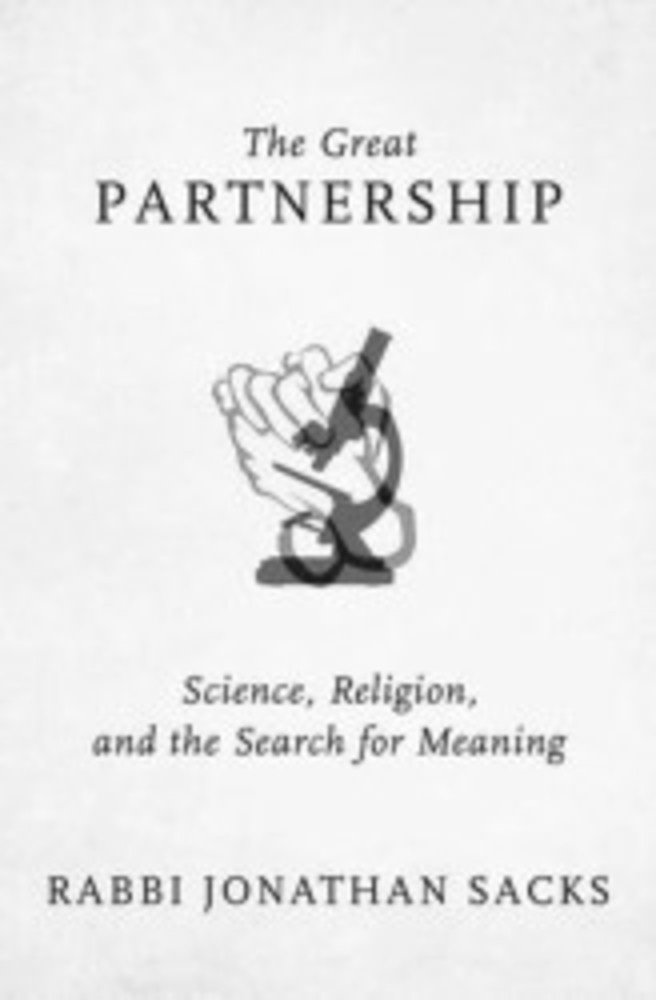“Life is Good” with Religion
Review of “The Great Partnership: Religion, Science and the Search for Meaning,” by Rabbi Jonathan Sacks
 Back in the 1990s, two brothers in Boston started a company devoted to spreading optimism. They called it “Life is Good” and they put that message on T-shirts and hats. They thought people were too negative and anxious about things.
Back in the 1990s, two brothers in Boston started a company devoted to spreading optimism. They called it “Life is Good” and they put that message on T-shirts and hats. They thought people were too negative and anxious about things.
Jonathan Sacks, the former chief rabbi of Orthodoxy in Great Britain, feels much the same way, and his message is not as different as you might think. His latest book defends religion against atheists who attack piety for causing many of the troubles in the world. It’s a broad and richly argued book, though with much less science than the title suggests. For him, religion is the only thing ultimately saving us from anxiety and despair.
He starts by clearing the air. We can’t prove either atheism or theism, so we have to choose based on other criteria. He focuses on the practical. The world can be a cold and scary place. Which approach gives us more courage to face the uncertainty and venture forth?
Religion, he says, is all about connecting our ordinary practical lives to what transcends the natural world. The three great Abrahamic faiths – Judaism, Christianity and Islam, teach that God has set up a good world for us, but that we have a responsibility to complete that goodness by respecting the divine dignity of others. That mission is so important that we need to swallow our personal fears and act. As Rabbi Nachman of Breslau said, “The world is like a narrow bridge, but you must not be afraid.”
Atheists have no such transcendent connection, Rabbi Sachs argues, so it’s harder for them to trust in the importance of what they do. They can still show tremendous courage and accomplish great things, but it often comes with an underlying anxiety. They believe in trusting only their immediate reality. Yet the world of nature, as revealed by science, is a Hobbesian arena of fearful individualistic competition.
Is he right? The “Life is Good” company has become a major success, accounting for over $100 million in annual sales from 600 products. People are looking for reassurances about life, despite the amazing affluence and security of modern times. Religious services, most of which involve praising and thanking God for such a good world, do much the same thing, though with far greater sophistication and with personal involvement.
Speaking of modern times, Rabbi Sacks goes on to suggest that religion, while responsible for some suffering, has been the greatest underlying force for progress in the world. It’s given us the courage to put aside our personal interests and cooperate, rather than continually fight in a zero-sum world. We’ve learned to treat others with dignity and to seek the common good.
There’s just one problem. Religion as a cultural force, at least in the West, has been declining since the 1800s. As several recent books have shown, the past two centuries have seen falling crime rates and even (despite two terrible world wars) greater world peace. People may be more anxious nowadays and less willing to walk around or let their kids play unsupervised, but we’re hardly falling into a Hobbesian free-for-all.
Rabbi Sacks suggests that we’ve continued to progress mainly because we’re living off the civilizing instincts developed over centuries of religious commitment. Those instincts, he says, are starting to wear off, as seen in weakening social ties. He makes much of the efforts of some recent thinkers to say that human beings have no more inherent dignity than animals. It’s not such a big step from these ideas to fascism.
While it won’t convince everyone, this learned and engaging book offers a timely defense of religion. Trusting in God is much more than a rational matter, but it has to make sense for the mind as well as heart.
We live in such a strongly secular age, and we Jews are so free to mix in secular society, that Judaism has become a choice. So we need more discussions around that choice.
“The Great Partnership: Religion, Science and the Search for Meaning,” by Rabbi Jonathan Sacks, 348 p., Schocken Books, 2012.
John Landry (jtlandry@verizon.net) is a member of The Jewish Voice editorial board.







